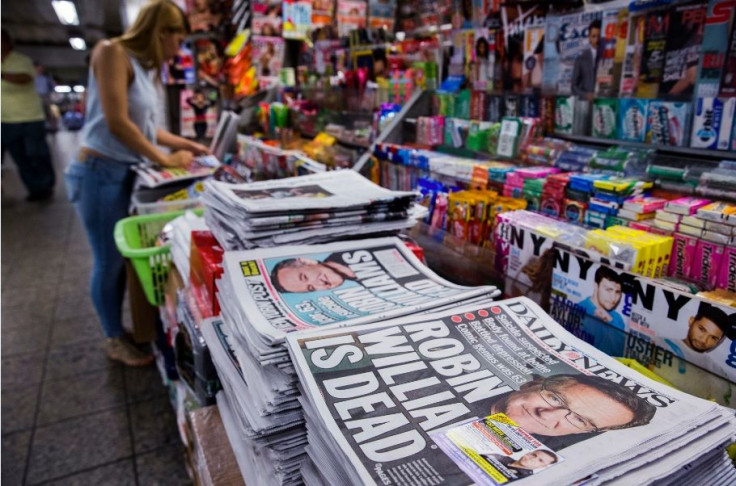Why Did Robin Williams Kill Himself? Actor's Suicide Sparks Debate

Robin Williams’ death has shocked the world and ignited a national debate about how people respond publicly to suicide. A tweet from The Academy of Motion Sciences bidding the actor farewell and a graphic New York Daily News cover detailing his death have contributed to the furor since his suicide on Monday.
The Academy, better known as the people responsible for the Oscars, came under fire this week after they shared an iconic image from “Aladdin,” the Disney cartoon that featured Williams as a lovable genie. “Genie, you’re free,” the caption read.
Genie, you're free. pic.twitter.com/WjA9QuuldD
— The Academy (@TheAcademy) August 12, 2014Critics deemed the tweet a dangerous validation of the act of suicide. The tweet was shared more than 270,000 times and an analytics site Topsy said as many as 69 million people could have seen it.
“If it doesn’t cross the line, it comes very, very close to it,” Christine Moutier, chief medical officer at the American Foundation for Suicide Prevention, told the Washington Post. “Suicide should never be presented as an option. That’s a formula for potential contagion.”
Meanwhile, law enforcement officials released graphic details about Williams' suicide on Tuesday. The cover of the New York Daily News’ Wednesday edition also caused an uproar when it featured Williams with the words “Hanged” in large bold print, along with details on how he killed himself.
“This is extremely untasteful and unnecessary!!” one user said on the newspaper's Facebook page. “Tasteless,” another simply wrote.
The American Association of Suicidology has advised journalists to sensitively cover the death because certain types of news coverage are believed to increase the likelihood of suicide in vulnerable individuals. The association noted that the risk of copycat suicides increases when the story specifically describes the suicide method, but covering the suicide carefully can change public misperceptions and prompt those who are vulnerable or at risk to seek help.
Williams was in an increasingly high-risk group for what some health care professionals have deemed a silent epidemic: middle-age suicide. Depression is a clinical sickness. It is much more than feeling sad and it is not a sign of weakness, say health professionals. Suicide is also more common than many people think. Americans are more likely to die by suicide than in a car accident.
“The urgency of the rate of depression to public health is likely compounded by the recognition that -- if not effectively treated -- depression is likely to lapse into a chronic disease,” the Centers for Disease Control and Prevention wrote. “Just experiencing one episode of depression places the individual at a 50 percent risk for experiencing another, with subsequent episodes raising the likelihood of experiencing more episodes in the future.”
Depression is treatable. Those who feel suicidal are urged to call National Suicide Prevention Life (1-800-273-8255) and seek professional help.
Follow me on Twitter: @mariamzzarella
© Copyright IBTimes 2024. All rights reserved.












